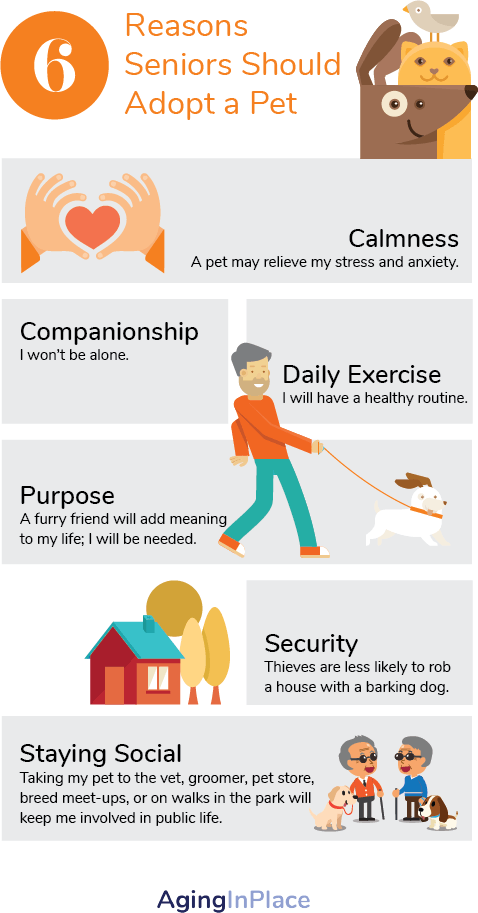Senior Spotlight: The Benefits Of Aging With A Pet
“Animals are such agreeable friends—they ask no questions; they pass no criticisms.”
George Eliot, British Author
It’s almost inarguable that the best things in life are not things at all; they are your loved ones – furry and four-legged kinds included! This week’s Senior Spotlight is a topic that we feel pretty passionate about, and that is the joys of pet ownership. Read on to see statistics on the benefits of pet ownership, what types of pets may be best for older adults, as well as a reality check on the pros and cons.
THE STATS
Animals not only make us feel good, but studies have shown that pet ownership is actually good for your health! According to AgingInPlace.org:
“…just 15 minutes bonding with an animal sets off a chemical chain reaction
in the brain, lowering levels of the fight-or-flight hormone, cortisol, and increasing production of the feel-good hormone serotonin. The result: heart rate, blood pressure and stress levels immediately drop. Over the long term, pet and human interactions can lower cholesterol levels, fight depression and may even help protect against heart disease and stroke”.
In other studies from the National Poll on Healthy Aging, Mayo Clinic & Pain Magazine:
| 88% of seniors said that their pets helped them enjoy life while 86% said that their pets made them feel loved.
| 42% of adults with healthy hearts own a dog as canine companions are linked to heart healthy habits such as regular exercise and time outdoors.
| 46% of seniors in fair or poor physical health have reported that pets take their mind off of their pain.
| 62% of seniors state that caring for critters helps keep a routine while 73% believe that pet care provides a sense of purpose.
| While isolation raises the risk of heart disease and stroke by 29% and 32% respectively, 65% of pet owners say that animals connect them with other people.
THE TYPES
Not all pets are created equal, and not all types of pets are a good fit for every potential owner. AgingInPlace.org mentions that senior dogs and cats may be better for older adults as they are more calm and require less maintenance than younger, higher energy companions. There are actual many programs (rescue included!) that match senior adults with senior pets! Don’t underestimate smaller pets too; rabbits don’t bark and prefer to use a litterbox; parakeet pairs add color and music to the home; fish can create a peaceful and calming atmosphere with easy, basic care.
THE CONSIDERATIONS
It would be amiss to advise that every adult wants, needs or is able to care for a pet. It may not be viable or safe for seniors with mobility issues to have an animal in the home. Furthermore, there are costs associated with owning every type of pet – so those on a tight budget could gain more financial stress than relaxation which negates the health benefits. Psychology Today also expresses concerns related to the delay of older adults entering senior communities to get the support they need for fear of leaving their pet behind. Likewise, ensuring that pet care is part of one’s estate plan can alleviate the fears over what will happen if one outlives their beloved companion.
For those who adore the camaraderie of animals but cannot provide full-time care, organizations such as the Alliance of Therapy Dogs and Therapy Dogs International can enable access to a trained service dog for timed sessions.
Cheers to a life filled with fun, fur and maybe even feathers!
Resources Used:
6 Reasons Seniors Should Consider Getting A Pet
The Challenges and Benefits of Pet Ownership for Seniors
Bobbi Decker
DRE#00607999
Broker Associate
650.346.5352 cell
650.577.3127 efax
www.bobbidecker.com
NAR Instructor….“Designations Create Distinctions”
CIPS, SRS, ABR, CRS, SRES, GRI, CLHMS, REI, AHWD, RSPS, MSLG
Bobbi Decker & Associates fully supports the principles of the Fair Housing Act and the Equal Opportunity Act. For more information, please visit: http://portal.hud.gov/













